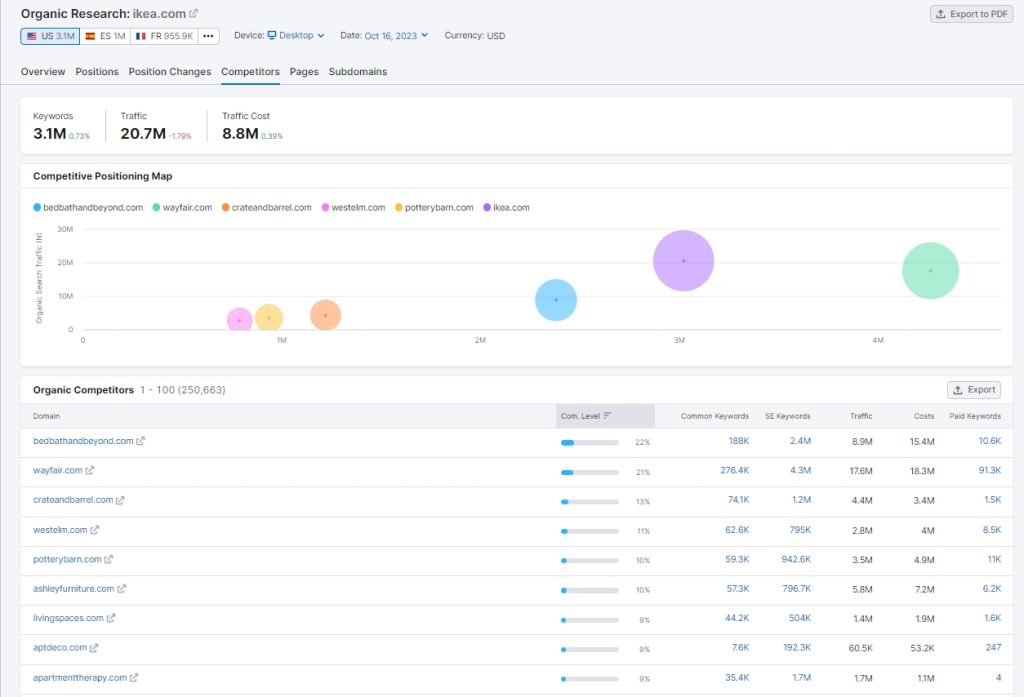To do a competitive analysis, you must first identify your competitors. This is not as simple as you think.
Yes, a competitor means any company that could prevent your customer from choosing your product or service (or influence them in this direction).
There are three types of competitors: direct competitor, indirect competitor and replacement competitor.
Let’s take an example so that you understand better:
- The direct competitor to an Apple iPhone is a Samsung Galaxy.
- The indirect competitor of an Apple iPhone is a Samsung tablet.
- And, Apple’s iPhone replacement competitor is Zoom.
Types of Competitors
Think about all types of competitors in order to predict future risks as much as possible.
For this analysis, go to SEMrush and click on the tool: Market explorer
Today we will take the example of the company IKEA to carry out this analysis.
In this tool, a dial appears on which you can see who your direct competitors are and where you are positioned.
Next, go to the “all domains” tab; this will show you all the statistics of the different traffic.
Then, if you are looking to find more competitors, you can go to the organic search tool and go to the “competitors” tab. If you scroll down, you will get the full list of your organic competitors.
You also have the option of exporting this data to an Excel or CSV file.

The Advertising Research and PLA Research
In your quest to maximize your brand’s online visibility and outperform the competition, SEMrush’s Advertising Research and Product Listing Ads (PLA) Research are invaluable resources to leverage.
These tools allow you to understand your competitors’ advertising strategies, spot untapped opportunities, and fine-tune your own marketing efforts.
Start by navigating to the Advertising Research tool. Here you can analyze your competitors’ paid advertising activities.
It gives you an overview of the keywords they are ranking for, the ads they are running, and even the ad budget they are spending.
Use this information to compare your performance to your competitors, identify gaps in your own advertising strategy, and uncover new opportunities for your advertising campaigns.
Next, head to the PLA Search tool. This tool is particularly useful if you sell products and use Google Shopping ads.
You can view your competitors’ products displayed in product listing ads, discover their product titles, descriptions, prices, and the keywords that trigger their ads.
By understanding how your competitors structure their product ads and what keywords they target, you can tailor your own PLA strategy to maximize your product visibility and attract more customers.

Analysis of Your Competitor’s Keywords
Of course, it is also possible with SEMrush to observe which keywords your competitors are placed on, to do this, simply go to the tab “Keyword Gap”.
Then, you enter the URL of the competitor websites to which you want to compare the keywords and you get this:

Finally, take all of this data and put it into a spreadsheet. If you notice that there are duplicates, delete them and finally, sort your document according to the level of competition.
Competitors at the top of the list are more likely to be direct competitors, further down the list will be indirect and surrogate competitors.
Conclusion
Competitor analysis on SEMrush can help you understand how to position yourself against the competition and how to boost your rankings. It starts off with an audit on your website that takes into account your traffic analytics, your top pages performance, keywords, backlinks and so on.
Then we use the SEMrush tools like Keywords Analysis, Keyword Gap Tool, PLA and so on to boost your organic search in search engines, and if that’s not enough we try to go with paid search ads and see how to find the best PPC.
Contact us if you need any help with SEMrush or anything other web related. We run the best web agency in Montreal and we have over 10 years of experience in marketing.






